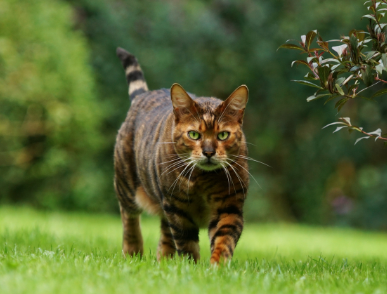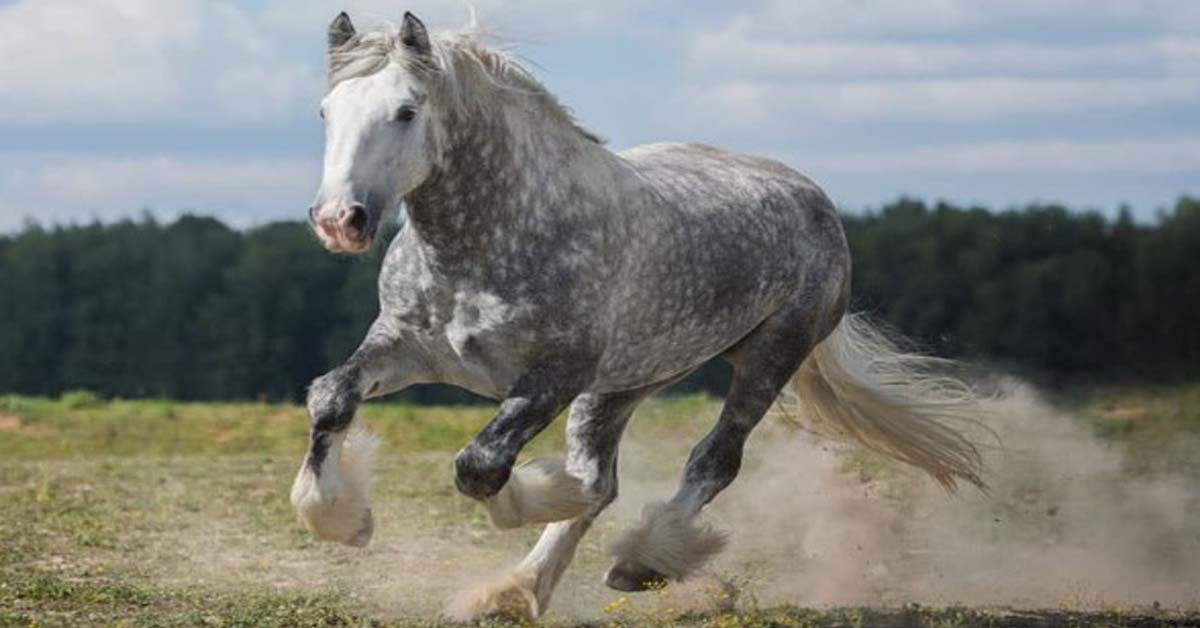Toyger cats are a rare and distinctive medium-sized breed with tiger-like markings. Originating in the United States during the 1980s, the Toyger stands out as one of the most recently developed and visually unique Toyger cat breeds.
What makes the Toyger particularly captivating is its domesticated nature combined with the striking appearance reminiscent of a wild tiger. Unlike naturally marked counterparts, such as the serval, this cat is a designer breed, akin to the Bengal, Savannah, and the nearly extinct California spangle.
Known for their playful and intelligent disposition, Toygers make an excellent choice for enthusiasts who appreciate the grandeur of big cats without the ethical concerns associated with owning a truly wild animal. Breeders of Toygers aspire to refine the cats’ resemblance to tigers over time. While recognized by The International Cat Association, it is noteworthy that the Cat Fanciers Association has yet to officially acknowledge this distinctive breed.
- ORIGIN: United States
- HEIGHT: 9-13 inches
- WEIGHT: 7-15 pounds
- LIFE SPAN: 9-13 years
- COLORS: chocolate/brown/sable
Toyger Cats Breed Characteristics
The Toyger cat is known for its friendly and easy-going nature, boasting an ideal temperament and personality. These feline companions seamlessly integrate into families with children or other pets, always ready for play and cuddle sessions. However, the Toyger’s energy level may not align with your expectations if you prefer a cat with a lower need for exercise commitment.
Given their intelligence, Toygers are susceptible to boredom, emphasizing the importance of engaging in playtime activities. Remarkably trainable, these cats can learn tricks and respond well to interactive sessions, making them not just delightful companions but also trainable and responsive to stimulation.
| Shedding Level: 3Point | Grooming: 1Point | Health Issues: 2Point |
| Stranger Friendly: 5Point | Adaptability: 5Point | Energy Level: 5Point |
| Child Friendly: 4Point | Social Needs: 3Point | Affectionate: 5Point |
| Dog Friendly: 5Point | Intelligence: 5Point |

History Of Toyger Cat
The notion of cultivating a domestic cat with a striking resemblance to a jungle lord sparked when Judy Sugden noticed two tabby markings on her cat Millwood Sharpshooter’s temple, breaking the commonality of cats named Tiger.
Embarking on this unique venture, Sugden initiated the breeding process with a striped domestic shorthair named Scrapmetal and a Bengal cat named Millwood, which exhibited distinctive rumpled spots. Later, she added a street cat from Kashmir, India, characterized by spots between the ears instead of traditional tabby lines. Collaborating with like-minded breeders such as Anthony Hutcherson and Alice McKee, they collectively aimed to bring to life cats that mirrored the majestic appearance of tigers.
This breeding endeavor focused on domestic cats featuring a large, long body, a tabby pattern, and rosettes characterized by elongated and branched circular markings on the head.
Recognition for the Toyger began when The International Cat Association (TICA) started registering it in 1993, granting it new breed status in 2000, and eventually awarding full championship recognition in 2007. Presently, TICA stands as the sole organization officially acknowledging the Toyger breed.
Appearance
In straightforward terms, Toygers unmistakably resemble miniature tigers. Among the myriad domestic cat breeds globally, the Toyger stands out as the one that most closely mirrors the iconic appearance of its wild counterpart, albeit in a significantly smaller form.
Characterized as a medium-sized cat breed, Toygers possess elongated muscular bodies, elevated shoulders, and rounded heads. Their distinctive stripes, reminiscent of tigers, are not their sole resemblance to these majestic wild cats. Toygers also exhibit shorter legs compared to other breeds, a trait commonly found in larger feline species, contributing to their overall feral cat aesthetic as they navigate their surroundings. Additionally, they boast long toes and sizable claws.
Temperament
Toygers showcase high intelligence and thrive on engaging challenges presented by their human companions. They easily learn tricks, such as fetching, and can be trained to walk on a leash with relative ease.
Beyond their striking appearance, Toygers are intentionally bred for a calm and friendly temperament. Kirsten Kranz, the director of Specialty Purebred Cat Rescue, describes their personality as “Bengal-like,” yet not as wild as a typical Bengal.
In comparison to Bengals, Toygers tend to be less independent and more relaxed. Kranz notes that Bengals, as a breed, are generally more self-reliant and active, making them potentially challenging for those new to cats or those unaccustomed to highly energetic feline companions. However, with the infusion of domestic genes into the Toyger breed, they tend to be more adaptable and easier to handle.
While Toygers may not match the activity levels of their Bengal relatives in terms of exploration and climbing, they still harbor a sense of adventure, especially when accompanied by their human companions. According to the Toyger Cat Society, these felines prefer staying close to their people, showing a preference for interactive play rather than solitary entertainment.
Toyger Cat Personality Overwev
The affectionate Toyger, characterized by its friendly, playful, and outgoing nature, delights in staying close to its human companions and harmonizes seamlessly with both children and other pets. Its amiable and easy-going personality makes the Toyger an ideal choice as a family companion, while its exceptional intelligence renders it highly trainable.
Health
Given that Toygers are a recently developed breed, pinpointing specific health concerns unique to them remains challenging. Nevertheless, it is crucial to have them undergo standard health checks for common feline issues such as patellar luxation and feline infectious peritonitis. Additionally, there is some indication that Toygers may be more prone to heart murmurs.
Veterinarian Michelle Beck, DVM, CCRT, CVA, from Backlund Animal Clinic in Omaha, Nebraska, emphasizes the importance of monitoring for prevalent cat health issues like kidney and heart disease routinely. She notes that kidney disease is a common ailment in cats, and heart disease is a matter of routine examination for all felines.
Beck also highlights that, by the age of 10, approximately 70 percent of cats may develop arthritis, a condition they adeptly conceal. This ability to mask pain, especially in breeds without well-known health issues, sometimes leads cat owners to overlook regular vet visits and preventative care.
While quality veterinary care is available for cats, Beck points out that cat owners may be less inclined to seek medical attention, particularly for indoor cats with minimal disease exposure and outdoor farm cats, which often lead solitary lives as proficient mousers.

Care
Grooming is a regular necessity for most domestic cats. Given their amiable nature, engaging in playtime and grooming routines with Toyger cats is typically straightforward for both owners and felines.
Toygers, being naturally active, require consistent exercise. Their high level of trainability allows owners to teach them activities like walking on a leash and fetching, although such training is not obligatory.
While toddlers often engage in independent play indoors, meeting their exercise needs, Toygers, despite having short hair, shed quite a bit and should be brushed weekly. Essential grooming practices, such as teeth brushing, ear cleaning, and regular nail trimming, contribute to their overall care and well-being.
Best Food For Toyger cats
Toyger cats don’t necessitate a specialized diet. Nonetheless, ensuring they receive high-quality dry or wet food is crucial for optimal health. Additionally, it’s essential to provide them with constant access to fresh, clean water.
While the temptation to reward your adorable feline with treats may arise, avoiding overfeeding is important, as it heightens the risk of obesity. Like many cats, Toygers exhibit diverse nutritional requirements at different life stages. Consulting your veterinarian to establish a suitable feeding routine is advisable to meet your toddler’s needs.
Feeding
The dietary needs of a Toyger closely align with those of any domestic shorthair cat. To safeguard your cat’s lifespan, collaborate with your veterinarian to establish an optimal feeding plan. Ensure your Toyger has access to top-quality wet and dry food, along with a constant supply of fresh, clean water.
Grooming
In terms of grooming, Toygers are easy to maintain. Brushing them weekly helps keep their coat soft and lustrous. To ensure a clean and tangle-free coat, regular bathing is advisable, with the National Cat Groomers of America suggesting a bath every four to six weeks.
Moreover, maintaining your Toyger includes regular nail trims, ideally every two weeks. Offering a scratching post aids in keeping their paws healthy. To minimize the likelihood of ear infections and dental issues, regular ear cleaning with a damp cotton ball and mild ear cleaner is recommended.
Consistent grooming not only fosters a strong bond with your cat but also enables you to monitor for any potential health issues. If any health concerns arise, prompt communication with your veterinarian is advisable.
Training And Exercise
Toygers are lively and agile cats, readily amenable to training. Teaching them tricks such as retrieving or taming is easily achievable.
While they may relish an occasional afternoon stroll, daily walks are not obligatory. Ensuring your cat receives ample indoor activity and attention is sufficient. Given that Toygers are typically active indoors, providing them with an abundance of interactive toys and games is recommended.
Given their high energy levels, if you observe a notable decline in their activity or appearance, it is crucial to promptly consult your veterinarian.
Adopting a Cat from Toyger Rescue or a Shelter
The Toyger is a distinctive and uncommon breed. While it’s less likely to encounter one in a shelter or through a rescue group, it’s worth exploring these avenues.
Occasionally, pedigreed cats find themselves in shelters due to circumstances like an owner’s passing, divorce, or changes in financial situations. Utilize platforms like PetFinder or Fancier’s Breeder Referral List, and inquire with breeders about the availability of Toygers in need of a new home.
Regardless of where you acquire your Toyger, ensure you establish a comprehensive contract with the seller, shelter, or rescue group, outlining responsibilities for both parties. In regions with “pet lemon laws,” it’s essential that both you and the cat’s provider understand your rights and available remedies.
Whether adopting a kitten or an adult, promptly visit your vet after bringing your Toyger home. This allows your veterinarian to identify any potential issues and collaborate with you to establish a preventive healthcare routine, mitigating the risk of various health concerns.
Toygar Cat Video
See More Cat Breeds For Further Research
FAQs
Toyger Cat Price In India
The cost of the Toyger cat breed in India typically ranges from ₹1,50,000 to ₹2,50,000.
Are Toygers friendly?
Certainly. Toygers are known for their high level of friendliness and can easily get along with children and other pets. However, each cat possesses its distinct personality, so it’s advisable to assess each Toyger individually before introducing them to new people or other animals.
What distinguishes a Bengal from a Toyger?
In terms of appearance, both cats resemble small wild felines, but Bengal cats feature visible fur, while Toygers boast vertical stripes. Their coat quality is quite similar, with both genders having soft, velvety hair and a striking sheen.
Is a Toyger a tiger?
Despite their rounded markings, white fur around the eyes, and tiger-like appearance, Toygers are bred solely for their resemblance to tigers and do not share the same genetic makeup. According to Sugden, the creator of Toygers, there is no actual tiger blood in them.
Are Toyger cats cuddly?
Absolutely. Toygers exhibit intelligence, affection, playfulness, and curiosity. Despite their wild and alluring appearance, they are equally lovable. These social animals enjoy being close to their owners and are fond of cuddling on the sofa.











